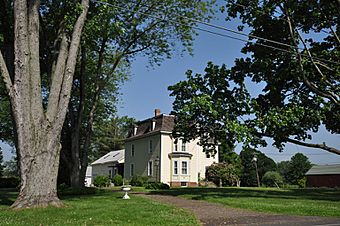Bradstreet Historic District facts for kids
Quick facts for kids |
|
|
Bradstreet Historic District
|
|
 |
|
| Location | Main St. & Depot Rd., Old Farm Rd., Hatfield, Massachusetts |
|---|---|
| Area | 266 acres (108 ha) |
| Architectural style | Greek Revival, Second Empire, Colonial Revival |
| NRHP reference No. | 97000724 |
| Added to NRHP | July 17, 1997 |
The Bradstreet Historic District is a special area in Hatfield, Massachusetts. It's like a time capsule that shows what a small village looked like in the 1800s. This district includes parts of Main Street, Depot Road, and Old Farm Road. Most of the buildings here were built in the second half of the 19th century. They show off popular styles from that time, like Queen Anne, Second Empire, and Colonial Revival.
This village grew on land that was first given to a colonial governor named Simon Bradstreet. That land was divided up way back in 1682. Since then, the area has mostly been used for farming. Because of its history and well-preserved buildings, the Bradstreet Historic District was added to the National Register of Historic Places in 1997.
Contents
Exploring Bradstreet Village
Bradstreet village is located in the northeastern part of Hatfield. It sits in a flat area near the Connecticut River, close to the border with Whately.
Main Roads and Farmland
Main Street and Depot Road are the two most important roads in the district. Main Street runs generally parallel to the river. Depot Road goes west towards North Hatfield. Between Main Street and the river, you'll find several small farm roads. These include Old Farm Road and Bashin Road. These roads are mostly lined with farm buildings.
Historic Farm Buildings
Many of the buildings you see are barns. These barns were used for drying tobacco. Tobacco was a very important crop in this area during the 1800s and 1900s. Most of the buildings in the district were built between the late 1700s and early 1900s. There is one newer neighborhood from the 20th century on Cronin Hill Road, but it's an exception.
Architectural Styles You Can See
Many of the houses in Bradstreet were built in the mid-1800s. You can see examples of the Greek Revival style, which was popular then. There are also a few Italianate style houses. A larger number of homes show the Colonial Revival and Craftsman/Bungalow styles. These styles were popular a bit later.



